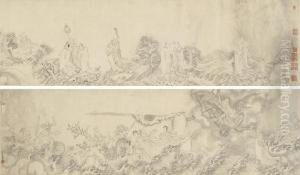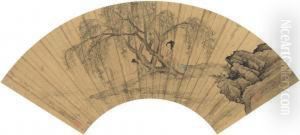You Qiu Paintings
You Qiu, born in 1949 in China, is a notable Chinese artist whose career spans various facets of the art world, including painting, printmaking, and art education. His work is deeply influenced by the rich cultural heritage of China, combined with a modern perspective that reflects the changing socio-political landscape of his homeland. Throughout his career, You Qiu has navigated the complexities of expressing traditional Chinese aesthetics alongside contemporary themes, making his work both a homage to the past and a commentary on the present.
After completing his formal education in fine arts, You Qiu embarked on a journey that saw him exploring various mediums and techniques. His early work was marked by an exploration of traditional Chinese painting methods, where he showed a keen interest in landscapes and historical themes. As his style evolved, You Qiu began incorporating more modern elements into his art, reflecting the rapid modernization and cultural shifts occurring in China during the latter part of the 20th century.
You Qiu's contributions to the art world are not limited to his own creations. He has been an influential figure in art education, dedicating a significant part of his career to teaching and mentoring young artists. Through his teaching, he has emphasized the importance of understanding traditional Chinese art forms while encouraging innovation and experimentation.
His work has been showcased in numerous exhibitions both in China and internationally, earning him recognition and accolades. You Qiu's art is characterized by its intricate detail, vibrant colors, and a unique blend of traditional and modern techniques. His paintings often depict scenes that are rich in narrative, inviting viewers to delve into the stories and histories that have shaped Chinese culture.
Despite the lack of detailed personal information available about You Qiu's life outside of his professional career, his art speaks volumes about his personal journey and perspective on the world. Through his work, You Qiu continues to contribute to the dialogue between the past and the present, making him a significant figure in the contemporary Chinese art scene.


